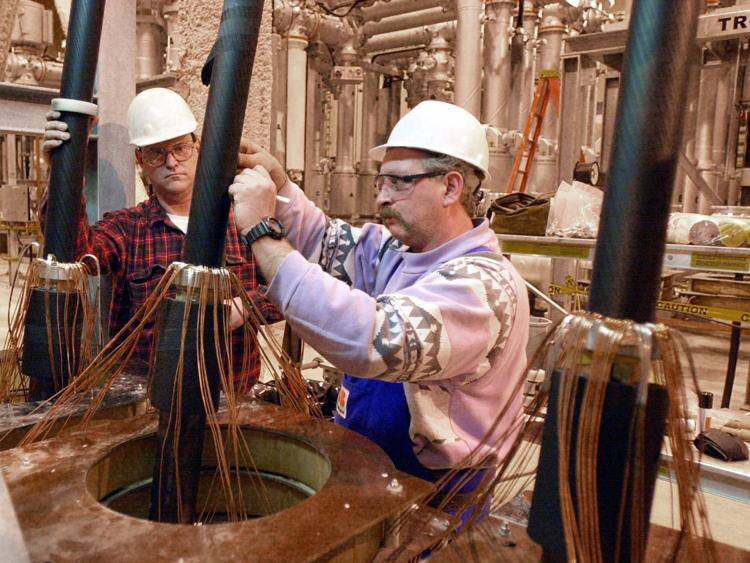Green-energy backers hope new social justice, ethics reforms coax lawmakers to ignore Exelon perks

Jochen Lang and Ken Wieringa, left, wire high voltage terminals at a ComEd substation in Chicago in 2001.
(The Center Square) – Environmental advocates are hoping new social justice and ethics enhancements to their signature green energy overhaul of Illinois’ power portfolio are enough to get it to Gov. J.B. Pritzker’s desk this fall, but a cloud of uncertainty still hangs over the bill that is seen as another handout for a power provider mired in a patronage scandal.
Groups behind the Clean Energy Jobs Act, or CEJA, announced changes to the proposed Illinois bill that they say better reflect the need for ethics reforms for power providers and social justice.
“These extraordinary crises call for bold action this fall that puts the people of Illinois first, not utilities and polluters,” said Jack Darin, director of the Sierra Club’s Illinois chapter.
Darrin said they’ll also advocate repealing rate hikes given to Exelon subsidiary ComEd by lawmakers in 2011.
CEJA, likened to the “Green New Deal” at the federal level, calls for disinvestment from non-renewable energy while retraining the displaced fossil fuel industry workforce to take green jobs. The goal is for the state to be entirely run on renewable energy by 2050.
In addition to CEJA’s original reforms, advocates intend to introduce an amendment that would introduce social equity redistribution on a regional basis and put more scrutiny on the ethics of all utility companies in a similar way ComEd is currently abiding by in their deferred prosecution agreement with federal authorities.
The reforms advocates are calling for could be the same issues that keep lawmakers timid to support CEJA this fall.
The legislation still calls for the Illinois Power Authority to create a secondary wholesale market for Exelon to sell its state-subsidized energy with priority over fossil-fuel burning companies. Currently, Exelon’s six nuclear power facilities offer wholesale energy on the PJM Interconnection auctions. The Trump administration installed a minimum offering for utilities on PJM because Exelon was able to offer power at a lower price because of state subsidies. Environmental advocates said the move was a handout to polluting power providers.
If the IPA offered Exelon a new market to sell on, opponents of CEJA say it would inevitably increase electricity costs for ratepayers.
“CEJA’s 600 pages will inflict billions of dollars in increased energy costs on Illinois ratepayers,” the Illinois Chamber of Commerce said in a statement. “This is not a choice between supporting green technologies/lowering emissions and cost.”
CEJA supporters maintain reforms in capacity offerings would make the secondary market run by the state cheaper for consumers.
“Illinois ratepayers are currently paying $1.8 billion per year for power plants to simply be on call for a few hours a year,” said Andrew Barbeau, senior consultant with the Environmental Defense Fund. “This system has been so tilted in the favor of fossil and polluter plants over the course of the last decade that it will still work to guarantee their profits even if we try to pursue a different future.”
Darrin said they had strong support from nearly half of the Illinois Legislature but didn’t clarify whether lawmakers still supported CEJA in light of ComEd’s admitted patronage scandal.

